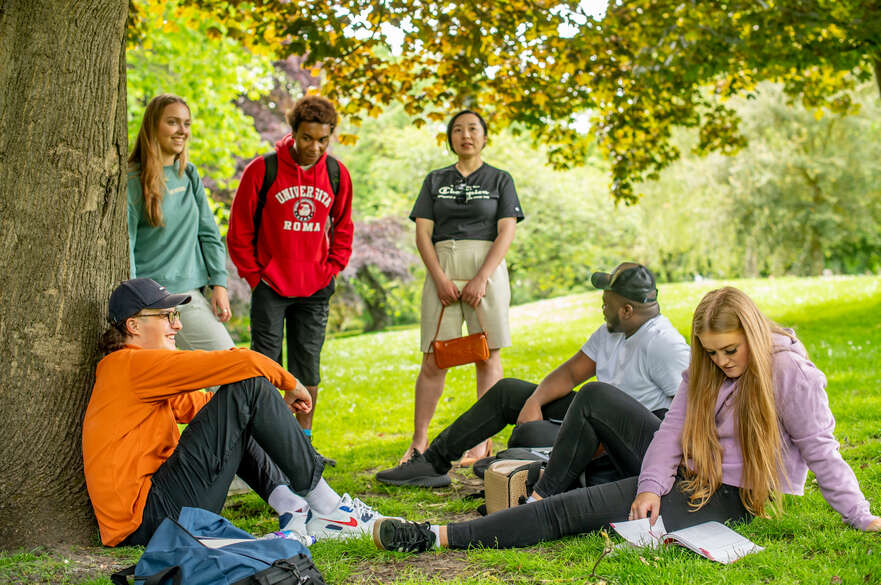Young people need meaningful involvement in local authority environmental policy – new report
A new report has called on local authorities to meaningfully involve young people in environmental policy after research showed they are feeling over-whelmed and disillusioned.
By Helen Breese | Published on 5 April 2023
Categories: Press office; Research; School of Social Sciences;

As part of the British Academy’s Where We Live Next project, the report examines youth engagement in environmental issues, including how – in which spaces and under what conditions – it can lead to public policy that is sustainable at city and local level.
It was carried out by researchers from Royal Holloway University, Nottingham Trent University (NTU) and the University of Sheffield and focused on two case study cities of London and Nottingham.
To understand how young people think about climate change, and the changes they want to see, views were gathered via a survey of more than 2,000 young people aged 16-24, along with a world café discussion event and focus groups involving more than 100 young people.
Researchers also interviewed a range of Greater London Authority peer outreach workers, civic leaders involved in policymaking across London and Nottingham, representatives from Nottingham’s universities and various civil society organisations.
For the young Londoners, their concerns were mainly personal, such as the impact of pollution on a family member’s asthma or rubbish on their streets, and they expressed different attitudes to the environment depending on their social class and where they lived in the city. They often connected the environment to broader issues associated with ‘poor and ignored’ neighbourhoods, as well as to other issues which they considered a priority, such as crime and mental health.

Young participants in the Nottingham focus groups appreciated the city's green spaces
In Nottingham, participants felt overall that the city was doing well in terms of public transport and green spaces, but some reported feeling sad, frustrated and having a strong sense of hopelessness when thinking about wide-ranging and irreversible environmental damage linked to climate change. They expressed concerns about global issues, particularly the impact of climate change around the world, including melting glaciers and polar icecaps, rising sea levels, extreme weather, and forest fires. They were also worried about plastic pollution and waste, such as littering, a lack of recycling opportunities, air and water pollution, and the loss of wildlife in their local communities.
When it came to solutions, young people felt that individual action would not have sufficient impact to address environmental issues. They also revealed feeling hopeless, powerless, and ultimately, having a deep sense of lack of usefulness. For some, this was connected to age, with older people perceived to have more power to make larger-scale changes compared to younger generations.
Many of them wanted the UK national government to take more action. When asked about solutions to environmental issues at the local level and the responsibility of local governments, the young people felt they had a lack of awareness and information. The majority of participants felt they did not know enough about environmental issues in general, and about ways to address environmental problems locally.
In the interviews with key local agents, policymakers stressed that they valued engagement with younger people and were committed to putting residents at the centre of their decision-making.
However, the findings suggested that while there were more engagement opportunities for young people at the local level than at the national level, the quality of this local engagement and interactions with policymakers is often seen as lacking. For example, the inclusion of young people in events after the big decisions have already been made was seen to be somewhat tokenistic and a major stumbling block to effective engagement.

Matt Henn, Professor of Social Research at NTU
Where children and young people were engaged in such local initiatives, they were typically involved as ‘recipients’ rather than more directly in two-way processes as active ‘co-producers’ of such environmental and carbon-reduction projects.
Professor Matt Henn from NTU’s School of Social Sciences, said: “There is an opportunity to use the enthusiasm of young people, and their local knowledge, to tackle environmental problems in their cities and neighbourhoods. This would go some way to creating a more sustainable and future-oriented public policy in the places where they live.
“However, young people are currently not included early enough in the design of environmental initiatives or in policy making, and they are not provided with the educational tools or platforms for deliberation to engage more fully in the policy process.
“By providing better quality opportunities for engagement with young people, civic authorities would play their part in turning fatalism and pessimism amongst young people into hope and action – mainstreaming youth engagement in environmental issues and helping to restore some faith in democracy.”
Professor James Sloam from Royal Holloway University added: “During COP26, there were many wonderful stories about how young people have led grass-roots initiatives across the world. But as the mass youth protests outside the conference venue and in cities across the world illustrated, young people do not feel they have a seat at the policy-making table.
“Our findings make for relatively sobering reading; young people lack confidence that their voices count for much in conversations about how best to address the climate emergency, while policymakers seem unsure regarding how best to engage young people in such matters.
“We recommend that young people from diverse backgrounds should be prioritised in local authority communications and community engagement, as well as ensuring their involvement in the design of local environment polices. More environmental education should also be offered in schools, including opportunities to take part in civic engagement and community projects.”
Read the full report online: Youth, Sustainability and Democracy: How Young People Can Shape Environmental Policy in Urban Spaces
The report connects to a wider body of work undertaken by NTU which explores democratic participation and engagement, alongside additional projects investigating methods of participation and links to local strategies on topics such as net zero and food poverty. The work is being lead by the Citizenship, Democracy and Transformation research group with support from Nottingham Civic Exchange, NTU’s place-based think tank.
Notes for Editors
Press enquiries please contact Helen Breese, Public Relations Manager, on telephone +44 (0)115 848 8751, or via email.
Notes to editors
Press enquiries please contact Helen Breese, Public Relations Manager, on telephone +44 (0)115 848 8751, or via email
About Nottingham Trent University
Nottingham Trent University (NTU) received the Queen’s Anniversary Prize for Higher and Further Education in 2021 for cultural heritage science research. It is the second time that NTU has been bestowed the honour of receiving a Queen’s Anniversary Prize for its research, the first being in 2015 for leading-edge research on the safety and security of global citizens.
The Research Excellence Framework (2021) classed 83% of NTU’s research activity as either world-leading or internationally excellent. 86% of NTU’s research impact was assessed to be either world-leading or internationally excellent.
NTU was awarded The Times and The Sunday Times Modern University of the Year 2023 and ranked second best university in the UK in the Uni Compare Top 100 rankings (2021/2022). It was awarded Outstanding Support for Students 2020 (Times Higher Education Awards), University of the Year 2019 (Guardian University Awards, UK Social Mobility Awards), Modern University of the Year 2018 (Times and Sunday Times Good University Guide) and University of the Year 2017 (Times Higher Education Awards).
NTU is the 5th largest UK institution by student numbers, with nearly 39,000 students and more than 4,400 staff located across five campuses. It has an international student population of 7,000 and an NTU community representing over 160 countries.
Since 2000, NTU has invested £570 million in tools, technology, buildings and facilities.
NTU is in the UK’s top 10 for number of applications and ranked first for accepted offers (2021 UCAS UG acceptance data). It is also among the UK’s top five recruiters of students from disadvantaged backgrounds and was the first UK university to sign the Social Mobility Pledge.
NTU is ranked 2nd most sustainable university in the world in the 2022 UI Green Metric University World Rankings (out of more than 900 participating universities).